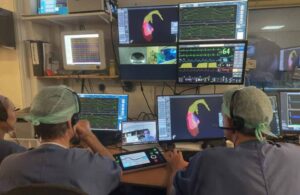
Guided by real-time MRI through the company’s NorthStar Mapping System, the case took place at Amsterdam University Medical Centre. Imricor says the procedure marked several world firsts, including the first ventricular ablation guided by real-time MRI. It also marked the first left-sided ablation performed under real-time MRI guidance, according to a news release. The patient received treatment for right-sided and left-sided premature ventricular complexes (PVCs).
Marco Götte, an imaging cardiologist at AUMC, served as initiator and is project leader for the hospital’s cardiac intervention MRI research program. Götte says MRI provides a better view of the anatomy of the heart and instruments for treatment during ablation. Unlike X-ray, it enables vision of the entire area surrounding the heart.
“We formed Imricor in 2006 with the goal of delivering MRI-compatible catheters and systems that would enable real-time MRI guidance of complex ventricular and atrial ablation procedures, where the power of MRI has the potential to deliver better, faster, safer, and less expensive treatment for patients suffering from irregular heartbeats,” said Steve Wedan, Imricor chair and CEO. “This achievement is a huge milestone for both Imricor and Amsterdam UMC.”
Imricor aims to bring MRI-compatible products to market for cardiac catheter ablation procedures. Its flagship offering, the Vision-MR ablation catheter, works under real-time MRI guidance. It aims to enable higher success rates and faster and safer treatment compared to conventional X-ray-guided catheters.
Vision-MR has European approval to treat type 1 atrial flutter. Imricor aims to seek approval for expanded indications in the future. It also has work underway in the early stages to bring its products to market in the U.S. and Australia.
